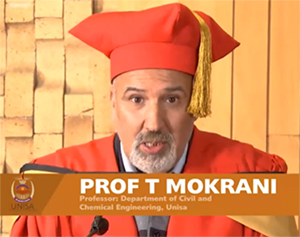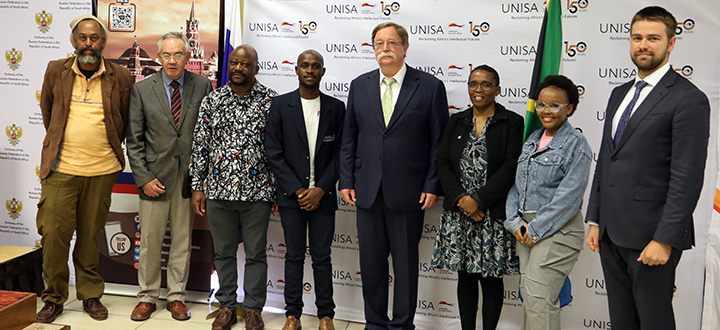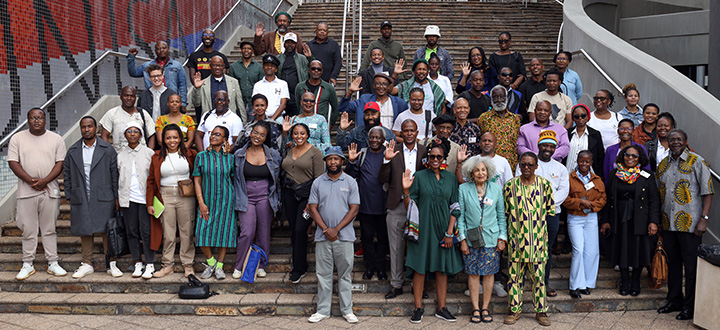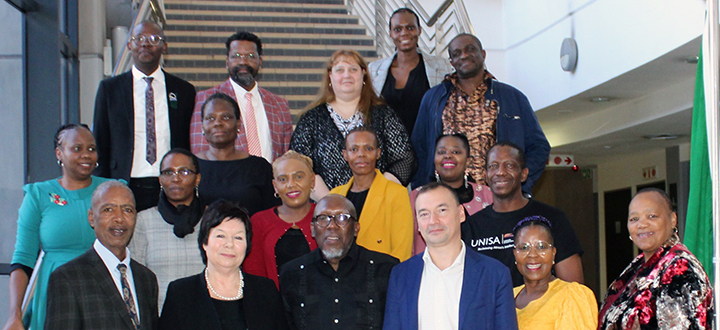College of Science, Engineering & Technology
Africa's abundant natural gas to energise the continent
 Prof Touhami Mokrani, of the Department of Chemical Engineering in the College of Science, Engineering and Technology, gave his inaugural lecture on 18 August 2021. The topic of his lecture was "Africa - the Dark Continent between myth and reality: The energy case study".
Prof Touhami Mokrani, of the Department of Chemical Engineering in the College of Science, Engineering and Technology, gave his inaugural lecture on 18 August 2021. The topic of his lecture was "Africa - the Dark Continent between myth and reality: The energy case study".
Initially dubbed the Dark Continent because its interior was mysterious and unknown to Western explorers, Africa is now indeed the darkest continent at night because of the inadequate supply of electricity. Despite the availability of renewable energy sources in the form of solar and natural gas, South Africa’s coal consumption is still the highest in the world (70.7%), even higher than that of China (58.2%) and India (55.9%), while its natural gas consumption is the lowest in the world (3%). This situation, said Mokrani, needs to be reversed if we are to realise a sustainable future.
Closing the gap
Mokrani’s lecture probed deep into the energy crisis in Africa. He said that the continent lags far behind the rest of the world, in particular other developing countries such as Thailand, Indonesia, Argentina and Chile. "If South Africa is importing crude oil from Middle Eastern countries, then surely the country can import natural gas," he said. "The technology is available to import natural gas via pipelines and across the ocean."
Natural gas is the fastest growing energy source and is envisioned to dominate the energy sector over the next 40 years. "I have a dream," said Mokrani, "and if this dream materialises, we will never again experience darkness, load shedding and indoor pollution. There are proven natural gas reserves available in Africa that have not yet been tapped into. The recent discoveries of natural gas reserves are exactly what is needed to mitigate the African energy crisis."
An unimaginable wealth of reserves
These natural gas reserves, explained Mokrani, can be found in Mozambique at 180 trillion cubic feet (Tcf), Tanzania at 57 Tcf, and in Senegal and Mauritania at 100 Tcf. (One trillion cubic feet corresponds to a tremendous volume, a volume that is out of the grasp of human imagination. One trillion cubic feet would be a corridor 9 metres tall and 9 metres wide, stretching around the earth three times.)
Furthermore, Africa is blessed with shale gas reserves. Algeria (third in the world) has reserves of 707 Tcf and South Africa (eighth in the world) 390 Tcf. Mokrani went on to add that Africa must benefit from natural gas in order to satisfy the growing energy demand, including power generation for household use and space heating. Liquefied petroleum gas, he said, can play an important role in supplying energy to rural areas and low-income households.
Speaking about his career after the conclusion of the lecture, Mokrani said that he has supervised one doctoral student and seven master’s students to completion. The doctoral student supervised managed to publish 12 journal articles in DHET-accredited journals, while two of the master’s students obtained distinctions. He is currently involved in the mentorship of one postdoctoral fellow. Mokrani undertakes research in fuel cells and nanotechnology, as well as in gas conversion (gas-to-liquid conversion via the methanol route). His research interests are in the field of sustainable energy, water and environment.
"As an African graduate (I studied in Algeria and South Africa) and an engineer and academic trained in Africa (specifically in Algeria, Libya and South Africa), I believe that through my research I can provide tangible solutions to address African energy challenges, while producing world-class research," concluded Mokrani.
* By Dr Nozipho N Gumbi, Acting Communication and Marketing Specialist, College of Science, Engineering and Technology
Publish date: 2021-08-26 00:00:00.0

 Unisa's student leadership engage with Russian ambassador
Unisa's student leadership engage with Russian ambassador
 Re-igniting and re-imagining Pan Africanism, Afrocentricity and Afrofuturism in the 21st century
Re-igniting and re-imagining Pan Africanism, Afrocentricity and Afrofuturism in the 21st century
 Unisa and Russian State University for the Humanities explore collaborative opportunities
Unisa and Russian State University for the Humanities explore collaborative opportunities
 Young Unisa science stars join elite Lindau Nobel Laureate group
Young Unisa science stars join elite Lindau Nobel Laureate group
 Education MEC addresses Unisa autism seminar
Education MEC addresses Unisa autism seminar